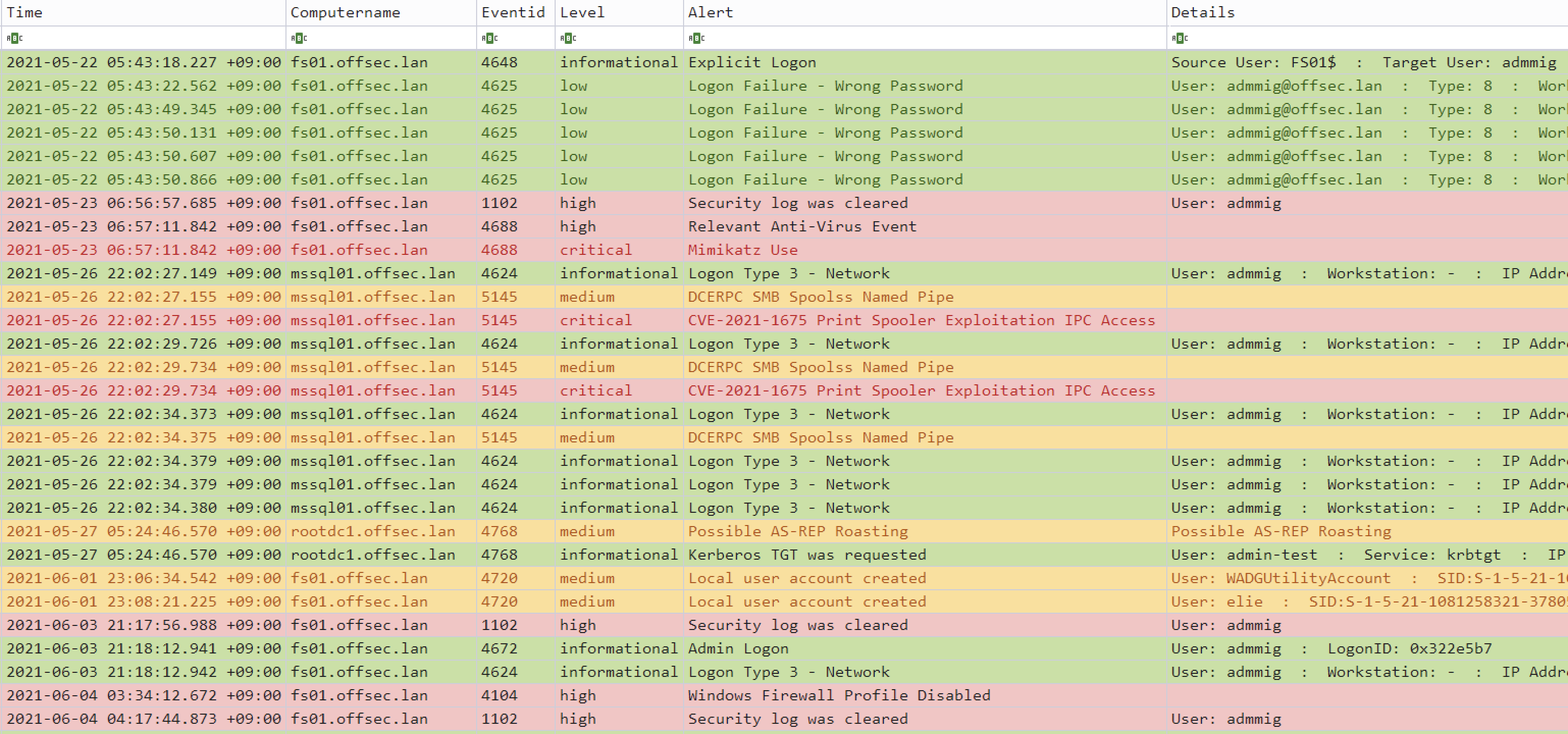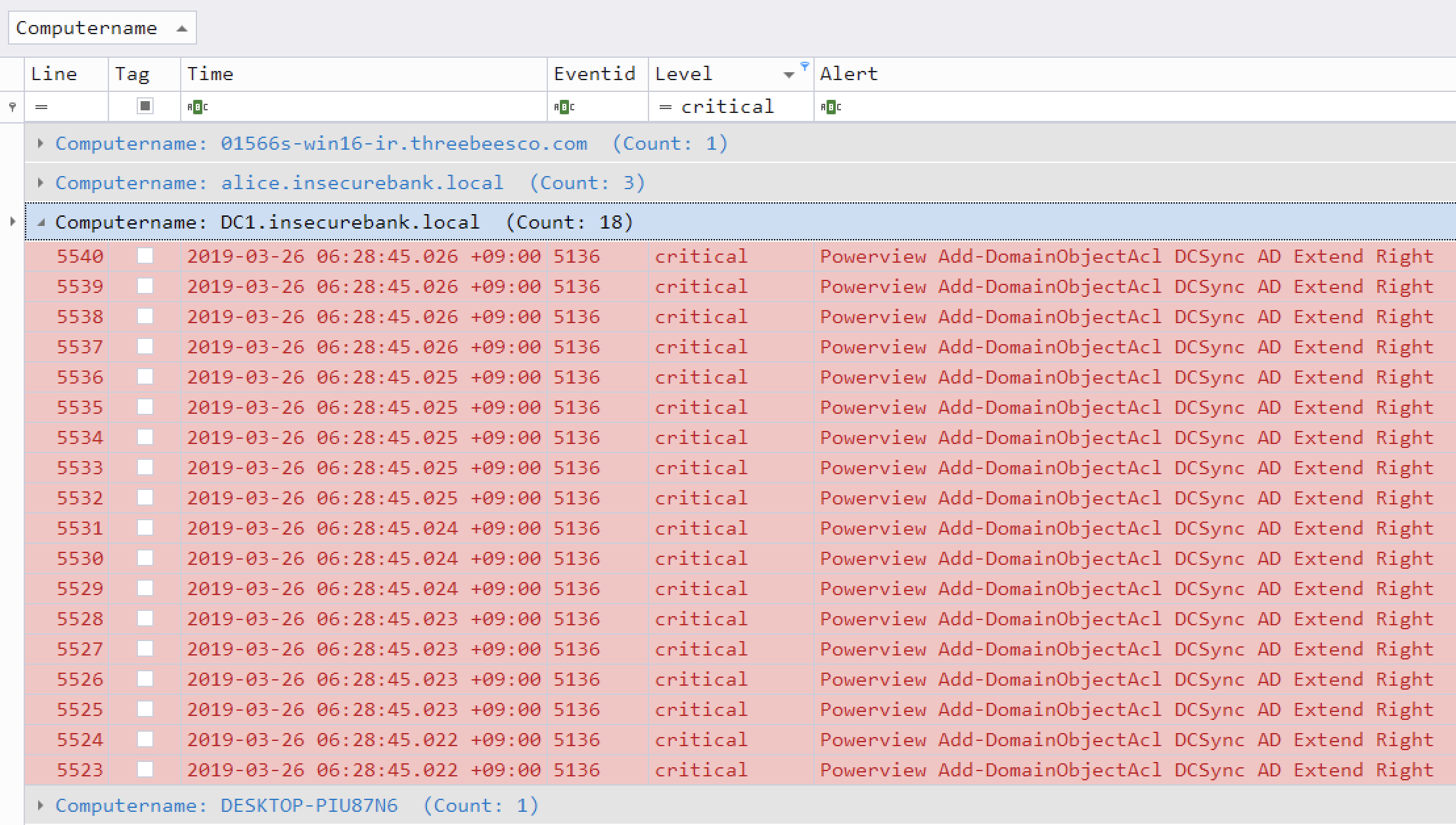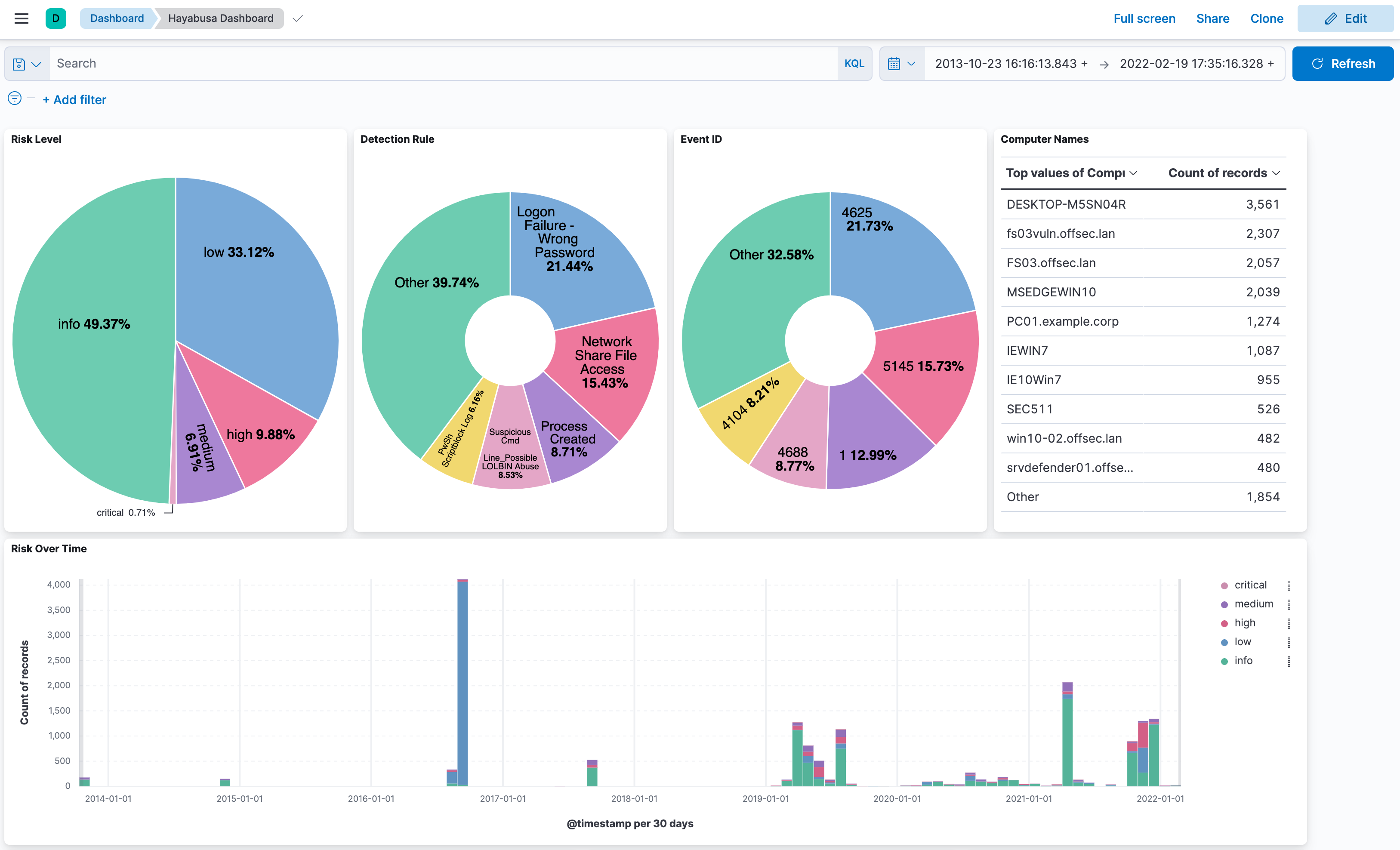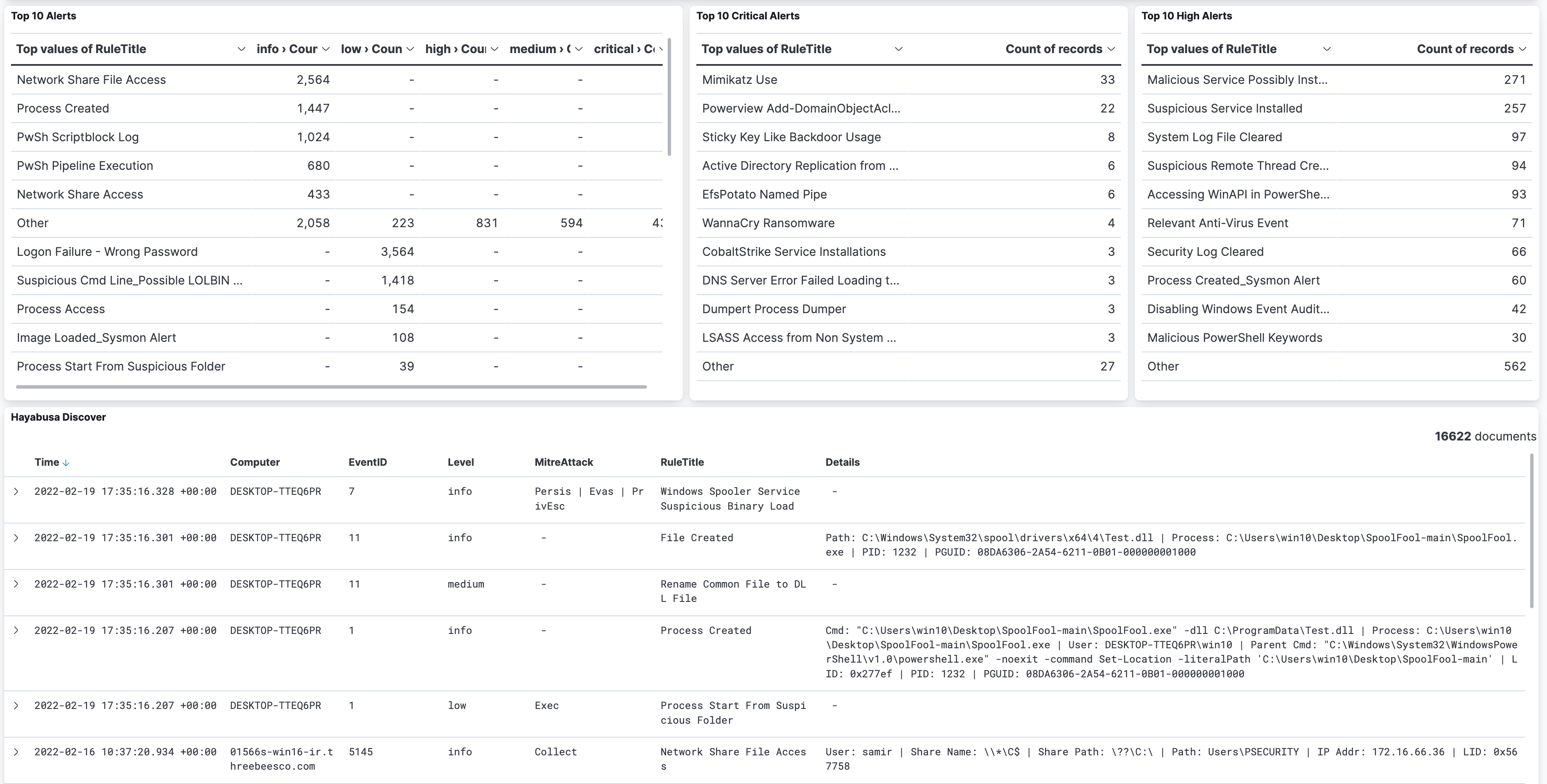About Hayabusa
Hayabusa is a Windows event log fast forensics timeline generator and threat hunting tool created by the Yamato Security group in Japan. Hayabusa means "peregrine falcon" in Japanese and was chosen as peregrine falcons are the fastest animal in the world, great at hunting and highly trainable. It is written in Rust and supports multi-threading in order to be as fast as possible. We have provided a tool to convert sigma rules into hayabusa rule format. The hayabusa detection rules are based on sigma rules, written in YML in order to be as easily customizable and extensible as possible. It can be run either on running systems for live analysis or by gathering logs from multiple systems for offline analysis. (At the moment, it does not support real-time alerting or periodic scans.) The output will be consolidated into a single CSV timeline for easy analysis in Excel, Timeline Explorer, or Elastic Stack.
Table of Contents
- About Hayabusa
- Screenshots
- Analyzing Sample Timeline Results
- Features
- Planned Features
- Downloads
- Git cloning
- Advanced: Compiling From Source (Optional)
- Running Hayabusa
- Usage
- Testing Hayabusa on Sample Evtx Files
- Hayabusa Output
- Hayabusa Rules
- Other Windows Event Log Analyzers and Related Resources
- Windows Logging Recommendations
- Sysmon Related Projects
- Community Documentation
- Contribution
- Bug Submission
- License
Main Goals
Threat Hunting
Hayabusa currently has over 2300 sigma rules and over 130 hayabusa rules with more rules being added regularly. The ultimate goal is to be able to push out hayabusa agents to all Windows endpoints after an incident or for periodic threat hunting and have them alert back to a central server.
Fast Forensics Timeline Generation
Windows event log analysis has traditionally been a very long and tedious process because Windows event logs are 1) in a data format that is hard to analyze and 2) the majority of data is noise and not useful for investigations. Hayabusa's main goal is to extract out only useful data and present it in an easy-to-read format that is usable not only by professionally trained analysts but any Windows system administrator. Hayabusa is not intended to be a replacement for tools like Evtx Explorer or Event Log Explorer for more deep-dive analysis but is intended for letting analysts get 80% of their work done in 20% of the time.
Screenshots
Startup
Terminal Output
Event Fequency Timeline (-V option)
Results Summary
Analysis in Excel
Analysis in Timeline Explorer
Critical Alert Filtering and Computer Grouping in Timeline Explorer
Analysis with the Elastic Stack Dashboard
Analyzing Sample Timeline Results
You can check out a sample CSV timeline here.
You can learn how to analyze CSV timelines in Excel and Timeline Explorer here.
You can learn how to import CSV files into Elastic Stack here.
Features
- Cross-platform support: Windows, Linux, macOS.
- Developed in Rust to be memory safe and faster than a hayabusa falcon!
- Multi-thread support delivering up to a 5x speed improvement.
- Creates a single easy-to-analyze CSV timeline for forensic investigations and incident response.
- Threat hunting based on IoC signatures written in easy to read/create/edit YML based hayabusa rules.
- Sigma rule support to convert sigma rules to hayabusa rules.
- Currently it supports the most sigma rules compared to other similar tools and even supports count rules and new aggregators such as
|equalsfield. - Event log statistics. (Useful for getting a picture of what types of events there are and for tuning your log settings.)
- Rule tuning configuration by excluding unneeded or noisy rules.
- MITRE ATT&CK mapping of tactics (only in saved CSV files).
- Rule level tuning.
- Create a list of unique pivot keywords to quickly identify abnormal users, hostnames, processes, etc... as well as correlate events.
- Output all fields for more thorough investigations.
- Successful and failed logon summary.
Planned Features
- Enterprise-wide hunting on all endpoints.
- MITRE ATT&CK heatmap generation.
Downloads
Please download the latest stable version of hayabusa with compiled binaries or the source code from the Releases page.
Git cloning
You can git clone the repository with the following command and compile binary from source code:
Warning: The main branch of the repository is for development purposes so you may be able to access new features not yet officially released, however, there may be bugs so consider it unstable.
git clone https://github.com/Yamato-Security/hayabusa.git --recursiveNote: If you forget to use --recursive option, the rules folder, which is managed as a git submodule, will not be cloned.
You can sync the rules folder and get latest Hayabusa rules with git pull --recurse-submodules or use the following command:
hayabusa-1.3.2-win-x64.exe -uIf the update fails, you may need to rename the rules folder and try again.
Caution: When updating, rules and config files in the
rulesfolder are replaced with the latest rules and config files in the hayabusa-rules repository. Any changes you make to existing files will be overwritten, so we recommend that you make backups of any files that you edit before updating. If you are performing level tuning with--level-tuning, please re-tune your rule files after each update. If you add new rules inside of therulesfolder, they will not be overwritten or deleted when updating.
Advanced: Compiling From Source (Optional)
If you have Rust installed, you can compile from source with the following command:
cargo clean
cargo build --releaseYou can download the latest unstable version from the main branch or the latest stable version from the Releases page.
Be sure to periodically update Rust with:
rustup update stableThe compiled binary will be outputted in the target/release folder.
Updating Rust Packages
You can update to the latest Rust crates before compiling:
cargo updatePlease let us know if anything breaks after you update.
Cross-compiling 32-bit Windows Binaries
You can create 32-bit binaries on 64-bit Windows systems with the following:
rustup install stable-i686-pc-windows-msvc
rustup target add i686-pc-windows-msvc
rustup run stable-i686-pc-windows-msvc cargo build --releasemacOS Compiling Notes
If you receive compile errors about openssl, you will need to install Homebrew and then install the following packages:
brew install pkg-config
brew install opensslLinux Compiling Notes
If you receive compile errors about openssl, you will need to install the following package.
Ubuntu-based distros:
sudo apt install libssl-devFedora-based distros:
sudo yum install openssl-develRunning Hayabusa
Caution: Anti-Virus/EDR Warnings
You may receive an alert from anti-virus or EDR products when trying to run hayabusa or even just when downloading the .yml rules as there will be keywords like mimikatz and suspicious PowerShell commands in the detection signature.
These are false positives so will need to configure exclusions in your security products to allow hayabusa to run.
If you are worried about malware or supply chain attacks, please check the hayabusa source code and compile the binaries yourself.
Windows
In Command Prompt or Windows Terminal, just run the 32-bit or 64-bit Windows binary from the hayabusa root directory.
Example: hayabusa-1.3.2-windows-x64.exe
Linux
You first need to make the binary executable.
chmod +x ./hayabusa-1.3.2-linux-x64-gnuThen run it from the Hayabusa root directory:
./hayabusa-1.3.2-linux-x64-gnumacOS
From Terminal or iTerm2, you first need to make the binary executable.
chmod +x ./hayabusa-1.3.2-mac-intelThen, try to run it from the Hayabusa root directory:
./hayabusa-1.3.2-mac-intelOn the latest version of macOS, you may receive the following security error when you try to run it:
Click "Cancel" and then from System Preferences, open "Security & Privacy" and from the General tab, click "Allow Anyway".
After that, try to run it again.
./hayabusa-1.3.2-mac-intelThe following warning will pop up, so please click "Open".
You should now be able to run hayabusa.
Usage
Command Line Options
USAGE:
-d, --directory [DIRECTORY] 'Directory of multiple .evtx files.'
-f, --filepath [FILE_PATH] 'File path to one .evtx file.'
-F, --full-data 'Print all field information.'
-r, --rules [RULE_DIRECTORY/RULE_FILE] 'Rule file or directory (Default: .\rules)'
-C, --config [RULE_CONFIG_DIRECTORY] 'Rule config folder. (Default: .\rules\config)'
-o, --output [CSV_TIMELINE] 'Save the timeline in CSV format. (Ex: results.csv)'
--all-tags 'Output all tags when saving to a CSV file.'
-R, --hide-record-id 'Do not display the EventRecordID number.'
-v, --verbose 'Output verbose information.'
-V, --visualize-timeline 'Output event frequency timeline.'
-D, --enable-deprecated-rules 'Enable rules marked as deprecated.'
-n, --enable-noisy-rules 'Enable rules marked as noisy.'
-u, --update-rules 'Update to the latest rules in the hayabusa-rules github repository.'
-m, --min-level [LEVEL] 'Minimum level for rules. (Default: informational)'
-l, --live-analysis 'Analyze the local C:\Windows\System32\winevt\Logs folder (Windows Only. Administrator privileges required.)'
--start-timeline [START_TIMELINE] 'Start time of the event logs to load. (Ex: "2020-02-22 00:00:00 +09:00")'
--end-timeline [END_TIMELINE] 'End time of the event logs to load. (Ex: "2022-02-22 23:59:59 +09:00")'
--rfc-2822 'Output timestamp in RFC 2822 format. (Ex: Fri, 22 Feb 2022 22:00:00 -0600)'
--rfc-3339 'Output timestamp in RFC 3339 format. (Ex: 2022-02-22 22:00:00.123456-06:00)'
--US-time 'Output timestamp in US time format. (Ex: 02-22-2022 10:00:00.123 PM -06:00)'
--US-military-time 'Output timestamp in US military time format. (Ex: 02-22-2022 22:00:00.123 -06:00)'
--European-time 'Output timestamp in European time format. (Ex: 22-02-2022 22:00:00.123 +02:00)'
-U, --utc 'Output time in UTC format. (Default: local time)'
--no-color 'Disable color output.'
-t, --thread-number [NUMBER] 'Thread number. (Default: Optimal number for performance.)'
-s, --statistics 'Prints statistics of event IDs.'
-L, --logon-summary 'Successful and failed logons summary.'
-q, --quiet 'Quiet mode. Do not display the launch banner.'
-Q, --quiet-errors 'Quiet errors mode. Do not save error logs.'
--level-tuning [LEVEL_TUNING_FILE] 'Tune alert levels. (Default: .\rules\config\level_tuning.txt)'
-p, --pivot-keywords-list 'Create a list of pivot keywords.'
--contributors 'Prints the list of contributors.'Usage Examples
- Run hayabusa against one Windows event log file:
hayabusa-1.3.2-win-x64.exe -f eventlog.evtx- Run hayabusa against the sample-evtx directory with multiple Windows event log files:
hayabusa-1.3.2-win-x64.exe -d .\hayabusa-sample-evtx- Export to a single CSV file for further analysis with excel, timeline explorer, elastic stack, etc... and include all field information:
hayabusa-1.3.2-win-x64.exe -d .\hayabusa-sample-evtx -o results.csv -F- Only run hayabusa rules (the default is to run all the rules in
-r .\rules):
hayabusa-1.3.2-win-x64.exe -d .\hayabusa-sample-evtx -r .\rules\hayabusa -o results.csv- Only run hayabusa rules for logs that are enabled by default on Windows:
hayabusa-1.3.2-win-x64.exe -d .\hayabusa-sample-evtx -r .\rules\hayabusa\default -o results.csv- Only run hayabusa rules for sysmon logs:
hayabusa-1.3.2-win-x64.exe -d .\hayabusa-sample-evtx -r .\rules\hayabusa\sysmon -o results.csv- Only run sigma rules:
hayabusa-1.3.2-win-x64.exe -d .\hayabusa-sample-evtx -r .\rules\sigma -o results.csv- Enable deprecated rules (those with
statusmarked asdeprecated) and noisy rules (those whose rule ID is listed in.\rules\config\noisy_rules.txt):
hayabusa-1.3.2-win-x64.exe -d .\hayabusa-sample-evtx --enable-noisy-rules --enable-deprecated-rules -o results.csv- Only run rules to analyze logons and output in the UTC timezone:
hayabusa-1.3.2-win-x64.exe -d .\hayabusa-sample-evtx -r .\rules\hayabusa\default\events\Security\Logons -U -o results.csv- Run on a live Windows machine (requires Administrator privileges) and only detect alerts (potentially malicious behavior):
hayabusa-1.3.2-win-x64.exe -l -m low- Create a list of pivot keywords from critical alerts and save the results. (Results will be saved to
keywords-Ip Addresses.txt,keywords-Users.txt, etc...):
hayabusa-1.3.2-win-x64.exe -l -m critical -p -o keywords- Print Event ID statistics:
hayabusa-1.3.2-win-x64.exe -f Security.evtx -s- Print verbose information (useful for determining which files take long to process, parsing errors, etc...):
hayabusa-1.3.2-win-x64.exe -d .\hayabusa-sample-evtx -v- Verbose output example:
Checking target evtx FilePath: "./hayabusa-sample-evtx/YamatoSecurity/T1027.004_Obfuscated Files or Information\u{a0}Compile After Delivery/sysmon.evtx"
1 / 509 [>-------------------------------------------------------------------------------------------------------------------------------------------] 0.20 % 1s
Checking target evtx FilePath: "./hayabusa-sample-evtx/YamatoSecurity/T1558.004_Steal or Forge Kerberos Tickets AS-REP Roasting/Security.evtx"
2 / 509 [>-------------------------------------------------------------------------------------------------------------------------------------------] 0.39 % 1s
Checking target evtx FilePath: "./hayabusa-sample-evtx/YamatoSecurity/T1558.003_Steal or Forge Kerberos Tickets\u{a0}Kerberoasting/Security.evtx"
3 / 509 [>-------------------------------------------------------------------------------------------------------------------------------------------] 0.59 % 1s
Checking target evtx FilePath: "./hayabusa-sample-evtx/YamatoSecurity/T1197_BITS Jobs/Windows-BitsClient.evtx"
4 / 509 [=>------------------------------------------------------------------------------------------------------------------------------------------] 0.79 % 1s
Checking target evtx FilePath: "./hayabusa-sample-evtx/YamatoSecurity/T1218.004_Signed Binary Proxy Execution\u{a0}InstallUtil/sysmon.evtx"
5 / 509 [=>------------------------------------------------------------------------------------------------------------------------------------------] 0.98 % 1s- Quiet error mode:
By default, hayabusa will save error messages to error log files.
If you do not want to save error messages, please add
-Q.
Pivot Keyword Generator
You can use the -p or --pivot-keywords-list option to create a list of unique pivot keywords to quickly identify abnormal users, hostnames, processes, etc... as well as correlate events. You can customize what keywords you want to search for by editing config/pivot_keywords.txt.
This is the default setting:
Users.SubjectUserName
Users.TargetUserName
Users.User
Logon IDs.SubjectLogonId
Logon IDs.TargetLogonId
Workstation Names.WorkstationName
Ip Addresses.IpAddress
Processes.Image
The format is KeywordName.FieldName. For example, when creating the list of Users, hayabusa will list up all the values in the SubjectUserName, TargetUserName and User fields. By default, hayabusa will return results from all events (informational and higher) so we highly recommend combining the --pivot-keyword-list option with the -m or --min-level option. For example, start off with only creating keywords from critical alerts with -m critical and then continue with -m high, -m medium, etc... There will most likely be common keywords in your results that will match on many normal events, so after manually checking the results and creating a list of unique keywords in a single file, you can then create a narrowed down timeline of suspicious activity with a command like grep -f keywords.txt timeline.csv.
Logon Summary Generator
You can use the -L or --logon-summary option to output logon information summary (logon usernames and successful and failed logon count).
You can display the logon information for one evtx file with -f or multiple evtx files with the -d option.
Testing Hayabusa on Sample Evtx Files
We have provided some sample evtx files for you to test hayabusa and/or create new rules at https://github.com/Yamato-Security/hayabusa-sample-evtx
You can download the sample evtx files to a new hayabusa-sample-evtx sub-directory with the following command:
git clone https://github.com/Yamato-Security/hayabusa-sample-evtx.gitNote: You need to run the binary from the Hayabusa root directory.
Hayabusa Output
When hayabusa output is being displayed to the screen (the default), it will display the following information:
Timestamp: Default isYYYY-MM-DD HH:mm:ss.sss +hh:mmformat. This comes from the<Event><System><TimeCreated SystemTime>field in the event log. The default timezone will be the local timezone but you can change the timezone to UTC with the--utcoption.Computer: This comes from the<Event><System><Computer>field in the event log.Channel: The name of log. This comes from the<Event><System><Channel>field in the event log.Event ID: This comes from the<Event><System><EventID>field in the event log.Level: This comes from thelevelfield in the YML detection rule. (informational,low,medium,high,critical) By default, all level alerts will be displayed but you can set the minimum level with-m. For example, you can set-m high) in order to only scan for and display high and critical alerts.RecordID: This comes from the<Event><System><EventRecordID>field in the event log. You can hidde this output with the-Ror--hide-record-idoption.Title: This comes from thetitlefield in the YML detection rule.Details: This comes from thedetailsfield in the YML detection rule, however, only hayabusa rules have this field. This field gives extra information about the alert or event and can extract useful data from the<Event><System><EventData>portion of the log. For example, usernames, command line information, process information, etc... When a placeholder points to a field that does not exist or there is an incorrect alias mapping, it will be outputted asn/a(not available).
The following additional columns will be added to the output when saving to a CSV file:
MitreAttack: MITRE ATT&CK tactics.Rule Path: The path to the detection rule that generated the alert or event.File Path: The path to the evtx file that caused the alert or event.
If you add the -F or --full-data option, a RecordInformation column with all field information will also be added.
Level Abbrevations
In order to save space, we use the following abbrevations when displaying the alert level.
crit:criticalhigh:highmed:medlow:lowinfo:informational
MITRE ATT&CK Tactics Abbreviations
In order to save space, we use the following abbreviations when displaying MITRE ATT&CK tactic tags.
You can freely edit these abbreviations in the config/output_tag.txt configuration file.
If you want to output all the tags defined in a rule, please specify the --all-tags option.
Recon: ReconnaissanceResDev: Resource DevelopmentInitAccess: Initial AccessExec: ExecutionPersis: PersistencePrivEsc: Privilege EscalationEvas: Defense EvasionCredAccess: Credential AccessDisc: DiscoveryLatMov: Lateral MovementCollect: CollectionC2: Command and ControlExfil: ExfiltrationImpact: Impact
Channel Abbreviations
In order to save space, we use the following abbreviations when displaying Channel.
You can freely edit these abbreviations in the config/channel_abbreviations.txt configuration file.
App:ApplicationAppLocker:Microsoft-Windows-AppLocker/*BitsCli:Microsoft-Windows-Bits-Client/OperationalCodeInteg:Microsoft-Windows-CodeIntegrity/OperationalDefender:Microsoft-Windows-Windows Defender/OperationalDHCP-Svr:Microsoft-Windows-DHCP-Server/OperationalDNS-Svr:DNS ServerDvrFmwk:Microsoft-Windows-DriverFrameworks-UserMode/OperationalExchange:MSExchange ManagementFirewall:Microsoft-Windows-Windows Firewall With Advanced Security/FirewallKeyMgtSvc:Key Management ServiceLDAP-Cli:Microsoft-Windows-LDAP-Client/DebugNTLMMicrosoft-Windows-NTLM/OperationalOpenSSH:OpenSSH/OperationalPrintAdm:Microsoft-Windows-PrintService/AdminPrintOp:Microsoft-Windows-PrintService/OperationalPwSh:Microsoft-Windows-PowerShell/OperationalPwShClassic:Windows PowerShellRDP-Client:Microsoft-Windows-TerminalServices-RDPClient/OperationalSec:SecuritySecMitig:Microsoft-Windows-Security-Mitigations/*SmbCliSec:Microsoft-Windows-SmbClient/SecuritySvcBusCli:Microsoft-ServiceBus-ClientSys:SystemSysmon:Microsoft-Windows-Sysmon/OperationalTaskSch:Microsoft-Windows-TaskScheduler/OperationalWinRM:Microsoft-Windows-WinRM/OperationalWMI:Microsoft-Windows-WMI-Activity/Operational
Progress Bar
The progress bar will only work with multiple evtx files. It will display in real time the number and percent of evtx files that it has finished analyzing.
Color Output
The alerts will be outputted in color based on the alert level.
You can change the default colors in the config file at ./config/level_color.txt in the format of level,(RGB 6-digit ColorHex).
If you want to disable color output, you can use --no-color option.
Event Fequency Timeline
If you add -V or --visualize-timeline option, the Event Frequency Timeline feature displays a sparkline frequency timeline of detected events.
Note: There needs to be more than 5 events. Also, the characters will not render correctly on the default Command Prompt or PowerShell Prompt, so please use a terminal like Windows Terminal, iTerm2, etc...
Dates with most total detections
A summary of the dates with the most total detections categorized by level (critical, high, etc...).
Top 5 computers with most unique detections
The top 5 computers with the most unique detections categorized by level (critical, high, etc...).
Hayabusa Rules
Hayabusa detection rules are written in a sigma-like YML format and are located in the rules folder. In the future, we plan to host the rules at https://github.com/Yamato-Security/hayabusa-rules so please send any issues and pull requests for rules there instead of the main hayabusa repository.
Please read the hayabusa-rules repository README to understand about the rule format and how to create rules.
All of the rules from the hayabusa-rules repository should be placed in the rules folder.
informational level rules are considered events, while anything with a level of low and higher are considered alerts.
The hayabusa rule directory structure is separated into 3 directories:
default: logs that are turned on in Windows by default.non-default: logs that need to be turned on through group policy, security baselines, etc...sysmon: logs that are generated by sysmon.testing: a temporary directory to put rules that you are currently testing.
Rules are further seperated into directories by log type (Example: Security, System, etc...) and are named in the following format:
- Alert format:
<EventID>_<EventDescription>_<AttackDescription>.yml - Alert example:
1102_SecurityLogCleared_PossibleAntiForensics.yml - Event format:
<EventID>_<EventDescription>.yml - Event example:
4776_NTLM-LogonToLocalAccount.yml
Please check out the current rules to use as a template in creating new ones or for checking the detection logic.
Hayabusa v.s. Converted Sigma Rules
Sigma rules need to first be converted to hayabusa rule format explained here. Most rules are compatible with the sigma format so you can use them just like sigma rules to convert to other SIEM formats. Hayabusa rules are designed solely for Windows event log analysis and have the following benefits:
- An extra
detailsfield to display additional information taken from only the useful fields in the log. - They are all tested against sample logs and are known to work.
Some sigma rules may not work as intended due to bugs in the conversion process, unsupported features, or differences in implementation (such as in regular expressions).
- Extra aggregators not found in sigma, such as
|equalsfield.
Limitations: To our knowledge, hayabusa provides the greatest support for sigma rules out of any open source Windows event log analysis tool, however, there are still rules that are not supported:
- Rules that use regular expressions that do not work with the Rust regex crate
- Aggregation expressions besides
countin the sigma rule specification. - Rules that use
|near.
Detection Rule Tuning
Like firewalls and IDSes, any signature-based tool will require some tuning to fit your environment so you may need to permanently or temporarily exclude certain rules.
You can add a rule ID (Example: 4fe151c2-ecf9-4fae-95ae-b88ec9c2fca6) to rules/config/exclude_rules.txt in order to ignore any rule that you do not need or cannot be used.
You can also add a rule ID to rules/config/noisy_rules.txt in order to ignore the rule by default but still be able to use the rule with the -n or --enable-noisy-rules option.
Detection Level Tuning
Hayabusa and Sigma rule authors will determine the risk level of the alert when writing their rules.
However, the actual risk level will differ between environments.
You can tune the risk level of the rules by adding them to ./rules/config/level_tuning.txt and executing hayabusa-1.3.2-win-x64.exe --level-tuning which will update the level line in the rule file.
Please note that the rule file will be updated directly.
./rules/config/level_tuning.txt sample line:
id,new_level
00000000-0000-0000-0000-000000000000,informational # sample level tuning line
In this case, the risk level of the rule with an id of 00000000-0000-0000-0000-000000000000 in the rules directory will have its level rewritten to informational.
Event ID Filtering
You can filter on event IDs by placing event ID numbers in config/target_eventids.txt.
This will increase performance so it is recommended if you only need to search for certain IDs.
We have provided a sample ID filter list at config/target_eventids_sample.txt created from the EventID fields in all of the rules as well as IDs seen in actual results.
Please use this list if you want the best performance but be aware that there is a slight possibility for missing events (false negatives).
Other Windows Event Log Analyzers and Related Resources
There is no "one tool to rule them all" and we have found that each has its own merits so we recommend checking out these other great tools and projects and seeing which ones you like.
- APT-Hunter - Attack detection tool written in Python.
- Awesome Event IDs - Collection of Event ID resources useful for Digital Forensics and Incident Response
- Chainsaw - A similar sigma-based attack detection tool written in Rust.
- DeepBlueCLI - Attack detection tool written in Powershell by Eric Conrad.
- Epagneul - Graph visualization for Windows event logs.
- EventList - Map security baseline event IDs to MITRE ATT&CK by Miriam Wiesner.
- Mapping MITRE ATT&CK with Window Event Log IDs - by Michel de CREVOISIER
- EvtxECmd - Evtx parser by Eric Zimmerman.
- EVTXtract - Recover EVTX log files from unallocated space and memory images.
- EvtxToElk - Python tool to send Evtx data to Elastic Stack.
- EVTX ATTACK Samples - EVTX attack sample event log files by SBousseaden.
- EVTX-to-MITRE-Attack - EVTX attack sample event log files mapped to ATT&CK by Michel de CREVOISIER
- EVTX parser - the Rust library we used written by @OBenamram.
- Grafiki - Sysmon and PowerShell log visualizer.
- LogonTracer - A graphical interface to visualize logons to detect lateral movement by JPCERTCC.
- RustyBlue - Rust port of DeepBlueCLI by Yamato Security.
- Sigma - Community based generic SIEM rules.
- SOF-ELK - A pre-packaged VM with Elastic Stack to import data for DFIR analysis by Phil Hagen
- so-import-evtx - Import evtx files into Security Onion.
- SysmonTools - Configuration and off-line log visualization tool for Sysmon.
- Timeline Explorer - The best CSV timeline analyzer by Eric Zimmerman.
- Windows Event Log Analysis - Analyst Reference - by Forward Defense's Steve Anson.
- WELA (Windows Event Log Analyzer) - The swiff-army knife for Windows event logs by Yamato Security
- Zircolite - Sigma-based attack detection tool written in Python.
Windows Logging Recommendations
In order to properly detect malicious activity on Windows machines, you will need to improve the default log settings. We recommend the following sites for guidance:
- JSCU-NL (Joint Sigint Cyber Unit Netherlands) Logging Essentials
- ACSC (Australian Cyber Security Centre) Logging and Fowarding Guide
- Malware Archaeology Cheat Sheets
Sysmon Related Projects
To create the most forensic evidence and detect with the highest accuracy, you need to install sysmon. We recommend the following sites:
Community Documentation
English
- 2022/01/24 Graphing Hayabusa results in neo4j by Matthew Seyer (@forensic_matt)
Japanese
- 2022/01/22 Visualizing Hayabusa results in Elastic Stack by @kzzzzo2
- 2021/12/31 Intro to Hayabusa by itiB (@itiB_S144)
- 2021/12/27 Hayabusa internals by Kazuminn (@k47_um1n)
Contribution
We would love any form of contribution. Pull requests, rule creation and sample evtx logs are the best but feature requests, notifying us of bugs, etc... are also very welcome.
At the least, if you like our tool then please give us a star on Github and show your support!
Bug Submission
Please submit any bugs you find here. This project is currently actively maintained and we are happy to fix any bugs reported.
License
Hayabusa is released under GPLv3 and all rules are released under the Detection Rule License (DRL) 1.1.
You can recieve the latest news about Hayabusa, rule updates, other Yamato Security tools, etc... by following us on Twitter at @SecurityYamato.


















